CTWM STAFF
DR. CLIVE LIPCHIN Director, Center for Transboundary Water Management clivearava@gmail.com
FAREED MAHAMEED Assistant Director, Center for Transboundary Water Management fareedalien4@gmail.com
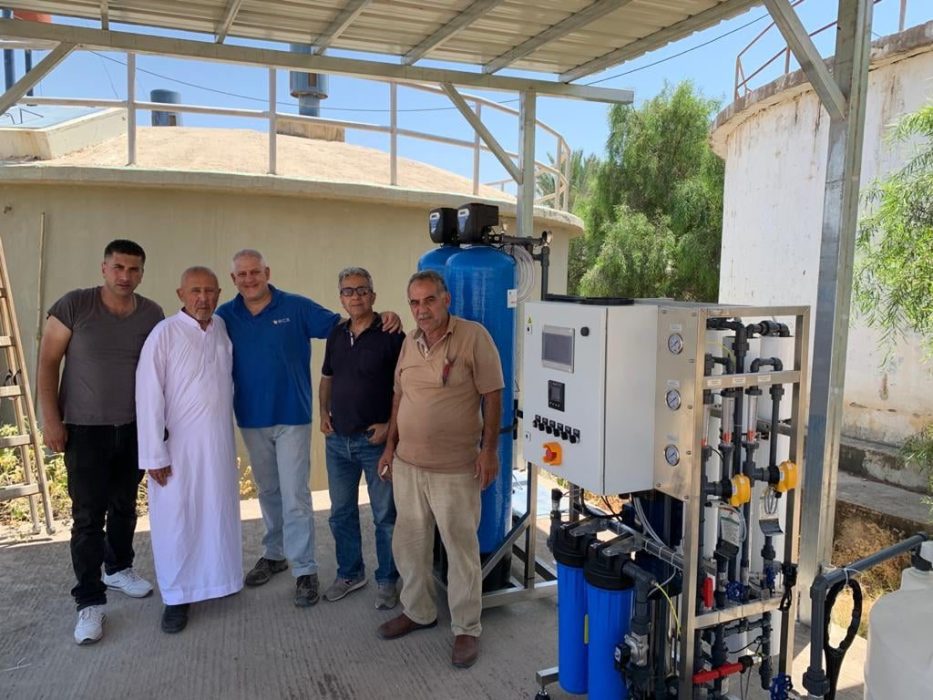
The Center for Transboundary Water Management, directed by Dr. Clive Lipchin, provides a platform for regional water professionals and policy makers to cooperate in water conservation, desalination, wastewater treatment and education. The Center facilitates direct communication among regional water professionals in the three lower riparian states of the Jordan River and Dead Sea Basin (Israel, Palestine and Jordan). The open dialogue that is made possible by the center enables the flow of data and, most importantly, establishes long-lasting relationships built on trust and integrity between those who are responsible for the sustainable management of the region’s fragile water resources.
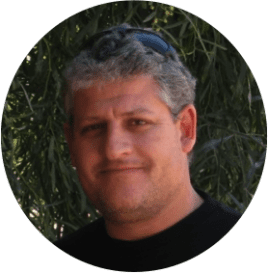
Dr. Clive Lipchin
Dr. Clive Lipchin holds a BA in applied psychology and zoology with an emphasis on wildlife management on private game farms in South Africa’s Northern Province, an MA in desert ecology from Ben-Gurion University of the Negev, and a PhD in resource ecology management from the School of Natural Resources and Environment at the University of Michigan, with a focus on public perceptions and attitudes towards water scarcity in Israel.
Dr. Lipchin joined the research and teaching staff of the Arava Institute in 2003, teaching multidisciplinary courses on water management in the Middle East, and overseeing research projects, workshops and conferences of the Center for Transboundary Water Management.
Dr. Lipchin's specialty is in water resources management and policy. He has published and presented widely on the topic of transboundary water management in the Middle East.
RESEARCH PROJECTS INCLUDE:
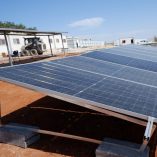
AL-FURAA OFF-GRID HUB
The Arava Institute has established an “Off-Grid Hub” based on a water-energy-food nexus framework, in partnership with the Al-Furaa Regional School. [Read more]
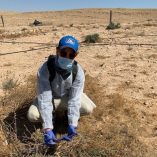
EVIDENCE-BASED WASTEWATER MONITORING AND POLICY FOR ADDRESSING THE COVID-19 PANDEMIC IN ISRAEL
This study testing wastewater in Bedouin villages for COVID-19 is aimed to help identify hot spots and prevent the spread of disease. [Read more]
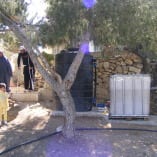
DECENTRALIZED GREYWATER TREATMENT AND REUSE FOR RURAL COMMUNITIES
The Center of Transboundary Water Management (CTWM) is looking at methods to reduce wastewater pollution while increasing water supply to households and communities in the West Bank located outside of the region’s wastewater treatment network. [Read more]
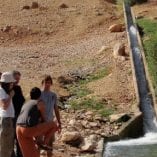
CROSS BORDER STREAM RESTORATION
The main objective of this research is to lay the foundation for effective stream restoration for the region’s transboundray streams by promoting and implementing the concept of transboundary watershed management. [Read more]
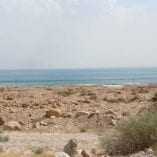
DEAD SEA BASIN RESEARCH
One of The Center’s main areas of focus is the Dead Sea, which is declining at an alarming rate of one meter per year. Though there are many reasons for the decline, the main cause has been the diversion of the freshwater source via the Jordan River by Israel, Jordan and Syria.
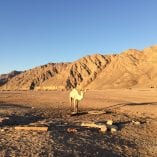
OFF GRID SOLAR POWERED DESALINATION
The Center successfully built and tested a prototype system and is now installing a larger system on a farm in the West Bank where saline groundwater is limiting the types of crops produced. On site and off grid desalination has the potential to improve water quality, thus expanding vegetable production and variety.
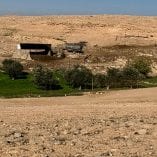
GREENinMED: WATER AND ENERGY EFFICIENCY FOR THE MEDITERRANEAN TOURISM INDUSTRY
The Center and other partners are developing innovative energy and water saving products and services for small and medium sized enterprises for tourism in the Mediterranean region.
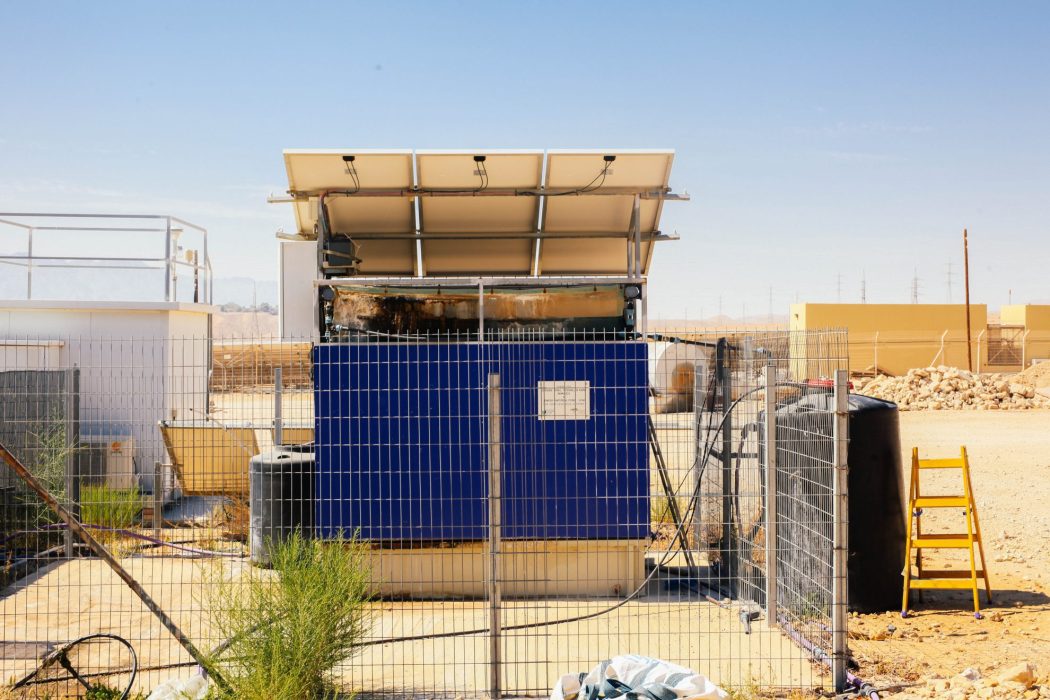
LAGUNA INNOVATION: VERTICAL GREENWALL GREYWATER TREATMENT AND REUSE SYSTEM
This system provides an innovative solution to limited access to water, sanitation, and electricity in off-grid communities with its three solar panels, and batteries which are being charged during the day for the technology to continue running smoothly at night.
PAST PROJECTS
A joint study conducted by Palestinian researchers from the Water & Environmental Development Organization together with Israeli researchers from the Arava Institute, Ben-Gurion and Tel Aviv Universities undertook the first-ever monitoring of pollution sources in transboundary streams in the region.
This unique experiment focused on two transboundary basins – the Hebron/Besor and Nablus/Alexander Streams – chosen as representatives of over ten streams that originate in land under the jurisdiction of the PA and flow into Israel. In a few cases, such as the Kidron or the Besor itself (that discharges inside the Gaza Strip), the roles are reversed with the Palestinians receiving Israeli discharges downstream. Regardless of flow direction, most transboundary streams are characterized by widespread pollution from Palestinian sources (typically raw sewage), as well as from Israeli sources.
The unabated pollution harms adjacent and in-stream ecosystems, contaminates ground water and constitutes a general aesthetic and health hazard. Management of these natural resources presents a special problem because of the complex security situation and its effect on the relations between the two governments. Joint management is required, but for the foreseeable future, cooperation requires considerable determination and resourcefulness.
The study aimed to:
- Profile both the specific and non-specific pollution sources in transboundary streams;
- Initiate a basin-wide network to monitor chemical and biological parameters in transboundary streams;
- Profile the various processes and causes of change in water quality of transboundary streams; and
- Propose optimal rehabilitation strategies based on the use of a computerized hydrological model and economic analyses of transboundary streams.
Arava Environmental Consulting and Technology and the Arava Institute for Environmental Studies have been contracted to undertake a study on the possible social and ecological impacts of a proposed Red Sea Dead Sea water conveyance system.
This study is a part of the World Bank’s two year Study Program on the feasibility of the Red Sea Dead Sea conduit, whose overall objective is to evaluate the conveyance of water from the Red Sea to the Dead Sea as a possible way to address environmental degradation of the Dead Sea Region and to examine the possibility of seawater desalination and energy production within the scope of the project. For more information, visit the World Bank’s Red Sea Dead Sea Project website.
An interdisciplinary and international research project providing scientific support for sustainable water management in the Jordan River.
From 2012 to 2015, the United States Agency for International Development (USAID) funded the Center of Transboundary Water Management (CTWM) through their Conflict Management and Mitigation Program at the West Bank/Gaza USAID Mission. CTWM’s grant, Mitigating Transboundary Wastewater Conflict, had the objective of aiding in reducing wastewater pollution while increasing water supply to households and communities located outside of the region’s wastewater treatment network.
Final Mitigating Transboundary Wastewater Conflicts Program Report
Final Mitigating Transboundary Wastewater Conflicts Program Report – Appendix 1
Final Mitigating Transboundary Wastewater Conflicts Program Report – Appendix 2
The Center was established in 2016 through funding from the United States Department of Agriculture’s (USDA) National Institute for Food and Agriculture (NIFA) and their Water for Agriculture Challenge Area initiative. The long-term goal of the program was to solve critical water resource problems in rural and agricultural watersheds across the United States.
A team of universities, governmental bodies and others, including the Arava Institute, the University of Delaware, University of Arizona, University of Maryland, the USDA and Cosmos ID, exploring non-traditional irrigation water sources worked to enable agricultural producers to conserve groundwater and developing cost-effective, sustainable water treatment technologies to improve the quality of the water sources. The study aimed to identify socio-behavioral, economic, and regulatory factors that impact the use of these sources and develop, implement, and evaluate on-farm treatment technologies for the safe and efficient use of non-traditional water. The knowledge gathered will be applied to local communities to engage people in experiential education and to teach, train and inspire future leaders.
Summaries of Water Quality Assessment 2019:
The project “Red Sea Plastic Free: An exhibit to end plastic pollution” was supported by the National Geographic Society, the U.S. Embassy in Israel, and the Municipality of Eilat. This project aimed to steer Eilat residents and tourists away from single-use plastics and to dispose of what they use in a more environmental way. This involved an arts-oriented and science-based educational and media campaign, while also working with businesses, festivals, and city officials to reduce the availability of single-use plastic in Eilat, and to encourage the adoption of reusables. At the center of the campaign was a life-size marine animal, an Eilat mascot for the Red Sea, chosen by the public from among a team of marine animal puppets.
Report: A new perspective on plastic waste in Israel – a circular economy

